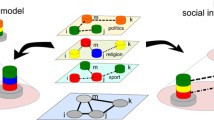Abstract
In this paper, we propose the approach of cross-cultural interactions. The main property of the model is the cone evolution in the infinite-dimensional Hilbert space. The approach considers agent states in the metric space with derived angle metric with the cultures clustering, which makes it possible to introduce the phenomenon of culture appearing. Here cluster is a subgroup of agents in one culture that can be also called a subculture. This work aims to formalize a new culture appearing from a mathematical point of view. We provide a simulation result of the developed model based on synthetic initial data.
Access this chapter
Tax calculation will be finalised at checkout
Purchases are for personal use only
Similar content being viewed by others
References
Belotelov, N., Loginov, F.: Migration model between countries with including educational process. Model. Decompos. Optim. Complex Dyn. Process. 33(1), 183–190 (2018)
Belotelov, N., Loginov, F.: Agent model of assimilation processes. Model. Decompos. Optim. Complex Dyn. Process. 34(1), 160–174 (2019). https://doi.org/10.14357/24098639190113
Belotelov, N.: A simulation model of migration processes in countries, taking into account the level of education. Math. Model. Numer. Methods 4(24), 91–99 (2019). https://doi.org/10.18698/23093684201949199
Bunyakovsky, V.: Sur quelques inegalités concernant les intégrales aux différences finies. Mem. Acad. Sci. St. Petersbourg 7(1), (1859)
Caillois, R.: Man, Play, and Games. University of Illinois Press (2001)
Dendrinos, S.D., Sonis, M.: Chaos and Socio-Spatial Dynamics. Springer, New York (1990)
Grof, C.: Spiritual Crisis. AST, Russia (2003)
Gumilev, L.: Ethnogenesis and the Earth’s Biosphere. Iris-Press, Russia (2016)
Kondratiev, Y., Kozitsky, Y.: Evolution of States in a Continuum Migration Model. Anal. Math. Phys. 8, 93–121 (2018)
Kapitza, S.P., Kurdyumov, S.P., Malinetsky, G.G.: Synergetics and forecasts of the future. Nauka, Moscow (1977)
Kapitza, S.P.: Global Population Blow up and After. The demographic revolution and information society. A Report to the Club of Rome. Tolleranza, Moscow. Hamburg (2007)
Lee, S.E.: A Theory of Migration. Demography 3(1), 47–57 (1966)
Lotman, Y.: About the Semiosphere. The Art - XXI century, Russia (2010)
Sonis, M.: Socio-ecology, competition of elites and collective choice, implications for culture of peace. Adv. Sociocybernetics Hum. Dev. 5(1), 77–83 (1997)
Weidlich, W.: Sociodynamics: a systematic approach to mathematical modelling in the social sciences. Wolfgang Weidlich - 2003, Fluctuation and Noise Letters, Vol. 03, No. 02, pp. L223–L232 (2003). https://doi.org/10.1142/S0219477503001294
Weidlich, W., Haag, G.: A Stochastic migration model and its application to Canadian data. In: Dynamics of Macrosystems, pp. 177–191 (1985). https://doi.org/10.1007/978-3-662-00545-3_15
Weidlich, W., Haag, G.: Concepts and Models of a Quantitative Sociology: The Dynamics of Interacting Populations. Springer Science & Business Media (2012)
Acknowledgments
Work was supported by RFBR #19-010-00423.
Author information
Authors and Affiliations
Corresponding author
Editor information
Editors and Affiliations
Rights and permissions
Copyright information
© 2022 The Author(s), under exclusive license to Springer Nature Switzerland AG
About this paper
Cite this paper
Loginov, F., Belotelov, N. (2022). Agent-Based Approach of Cross-Cultural Interactions in Hilbert Space. In: Arai, K. (eds) Proceedings of the Future Technologies Conference (FTC) 2021, Volume 1. FTC 2021. Lecture Notes in Networks and Systems, vol 358. Springer, Cham. https://doi.org/10.1007/978-3-030-89906-6_18
Download citation
DOI: https://doi.org/10.1007/978-3-030-89906-6_18
Published:
Publisher Name: Springer, Cham
Print ISBN: 978-3-030-89905-9
Online ISBN: 978-3-030-89906-6
eBook Packages: Intelligent Technologies and RoboticsIntelligent Technologies and Robotics (R0)




